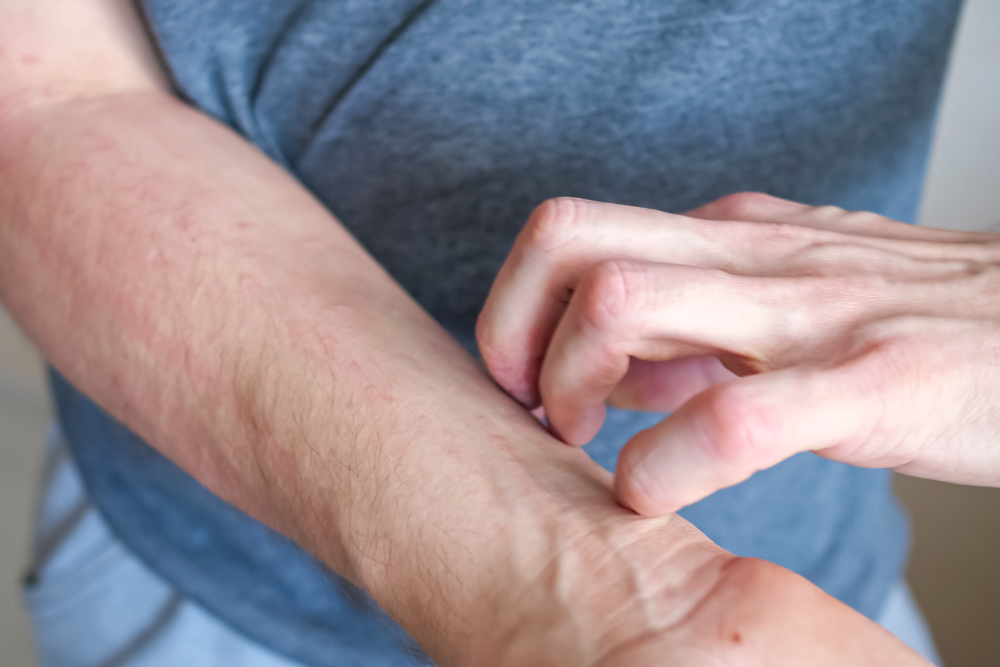Did you know that one of the MOST prevalent skin conditions across the U.S. is eczema? If that doesn’t make you feel less alone, know that in the United States alone, this skin condition touches an approximate 31.6 million individuals.[1] Affecting adults and children alike, more than 10% of children under 10 are equally diagnosed.[2] Eczema doesn’t necessarily have a one-stop cure, however with proper knowledge, understanding and information, managing the conditioning and minimizing rash outbreaks is incredibly possibly.

First things first: you’ll need to recognize your symptoms. Untreated, you’ll be left feeling uncomfortable in your skin. But the good news is eczema, even severe, can become a bearable condition.
What are the Causes of Eczema?
There’s not one single cause for eczema and more so, this skin condition isn’t contagious. In certain individuals, eczema is linked to an overreactive response by the body’s immune system to certain irritants[3]. In other words, being exposed to certain environmental factors can lead to a flare-up in certain individuals. A few of these environmental factors include:
- Reactions to foods like dairy, eggs, nuts, seeds, soy or wheat, for example;
- Emotional, physical, mental stress;
- Change in hormones.
- Chemical irritants from soap, detergent, shampoo, cream, etc.;
- Allergic reactions to dust mites, pets, pollen and mold, for example;
- Changes in hot and cold temperatures or water;
Eczema has greater chances of starting in childhood, before the age of 5 (approximately 70% of cases).[4] Only about 40% of these children will eventually grow out of the condition, while the others will continue to live with their symptoms all throughout their adult life[5].
If you think eczema might be the skin condition affecting you, make a journal of how your body reacts to these different triggers. Doing so may help you identify your causes and eventually help you avoid a flare-up altogether. Of course, sometimes, despite our best efforts, we still face a pretty strong flare, in which a doctor and medical treatments are highly recommended.
“Eczema is a condition in which the immune system overreacts to certain triggers in the environment, such as small irritants or allergens,” said Dr. Amir Aboutilebo, Houston-native board certified dermatologist. “When the skin comes into contact with these triggers, the immune system mistakes them for harmful foreign invaders and activates the body’s natural defense system. This defense mechanism involves the production of inflammation, which can cause the characteristic symptoms of eczema on the skin, such as redness, itching, and dryness.”
What are the Signs and Symptoms of Eczema?
There’s no age for eczema – from birth to old age. It’s a lifelong skin condition that can flare up periodically with varying severity degrees that differ from person to person. If you leave this skin condition untreated, it won’t simply go away on its own. Your eczema flare-ups will continuously get worse. A few symptoms[6] you may be experiencing include:
- Itchy, scaly skin patches anywhere on the body, including the scalp;
- Reddish, brownish and grayish skin patches;
- Irritated, dry skin;
- Thick, cracked skin areas;
- Small, raised skin bumps that may leak and scab;
- Raw, sore, sensitive skin from irritation and scratching.
Although eczema doesn’t have a predestined spot on the body[7], it does have more chances of appearing in the following areas:
- The feet and hands;
- The buttocks area.
- The elbow folds;
- Behind the ears,
- Behind the knees;
- The face area, the cheeks;
Furthermore, this skin condition can affect more than one area of the body at a time. You may be dealing with a flare-up on both your elbows and your knees. One of the most important things to remember when in a flare is NOT to scratch your skin. This will worsen the irritation and can lead to greater problems.
If your symptoms are affecting your daily life, such as preventing you from getting a good night’s sleep, and if home remedies and over-the-counter creams aren’t providing you with any relief, you may want to contact your doctor.
What are the Treatments for Eczema?
For certain people dealing with mild eczema, regular moisturizing of the skin with a proper cream may be a good enough solution. In other more severe cases, though, managing flare-ups might require the help of a doctor.
Eczema is easily diagnosed but may be mistaken for something else, so your doctor may want to review your family history or use patch tests to verify for any other possible diseases. If eczema is truly what you’re dealing with, there are a variety of different possible treatments:
- Dupixent. If you’re over the age of 12, your doctor may want to try this treatment. A relatively new topical therapy that targets inflammation, one of the leading causes of eczema. It is administered through an injection[8].
- Corticosteroid cream. Commonly prescribed by doctors, this cream or ointment is applied directly to the affected skin. Certain doses are pretty strong and thus, hydrating the skin with good quality cream is often recommended with this treatment. Oral treatments containing the same medication are also available and may be prescribed to help tackle your immediate symptoms.
- Home remedies. Although they may not require a prescription, your doctor may want you to try a few common home remedies that have proven effective over time.
- Gently moisturizing twice a day;
- An anti-itching cream like 1% hydrocortisone;
- Allergy medications;
- The use of a humidifier at home;
- Wearing looser clothing to allow the skin to breathe.
More so, there’s no harm done in combining more than one treatment at a time in order to achieve the best possible results. This is also true for prescription treatments combined with home remedies.
“Eczema is a chronic condition that cannot be cured. However, there are several treatments available that can help to manage your symptoms and provide some relief,” said Dr. Aboutilebo. “While it may not be possible to completely eliminate your symptoms, these treatments can help to reduce their frequency and severity.”
How to Live with Eczema
There are millions of people who live with eczema, just like you. In all honesty, it can be a painful, irritating and itchy skin condition – notably so if left untreated. With proper care, you can reduce your outbreaks in number and in length. It would be best to start by recognizing your symptoms and understanding your personal triggering causes.
Once you’ve identified your environmental irritants, do your best to avoid them as much as possible. Moisturize your skin regularly to keep hydrated and use quality, non-scented products. Take shorter, less hot showers and avoid rubbing yourself with a towel to dry off.
“You have identified certain environmental irritants that seem to trigger your eczema, it is best to try to avoid them as much as possible,” said Dr. Aboutilebo. “Taking steps to moisturize your skin regularly and using non-scented products can help to keep your skin hydrated and healthy. It is also a good idea to take shorter, lukewarm showers and to gently pat your skin dry rather than rubbing it with a towel after bathing, as these measures can help to minimize irritation and dryness.”
When it comes to treatments and medications, it’s always best to ask for a doctor’s advice. Even with your best efforts, you may still experience symptoms, and therefore, a doctor’s knowledge and approval can go a long way! Do your research, take your notes and learn about yourself and your body.








